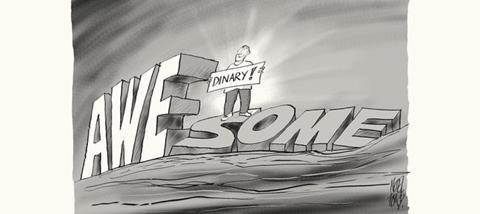
The grinning waiter breathlessly affirmed my meal choice, enthusing that the pepperoni pizza was truly awesome. It wasn’t. It was undeniably tasty. But awesome it was not.
The Lego Movie included a catchy ditty, which insisted that when we stick together and act as a team, everything is awesome. But it’s not true. The best teams slog away when the task set before them is tedious, backbreaking and even heartbreaking.
Perhaps awesome should be a reserved word, designated as a descriptor for only that which is genuinely epic.
A brilliant orange sunset, slowly sizzling into the sea, setting fire to grey, utilitarian clouds. The hand-holding veteran lovers who have just celebrated their 70th wedding anniversary and whose old eyes still glow for one another. These things are awesome.
Speaking of people, what of us? Are we all awesome? Perhaps some of us rush to retort that everyone is special. That’s true enough, in that each and every one of us is fearfully and wonderfully made. God doesn’t have a production line, but makes irreplaceable people, breaks the mould and starts all over.
But we’re not all amazing.
Such a blunt statement will be galling to those who insist that everyone is extraordinary; that school sports days should have no losers, only winners. But when there are no losers, there are no real winners either. When excellence is diluted to make it accessible to all, there’s no authentic achievement.
To be told that we’re all awesome, that we can do whatever we dream about, is the stuff of Disney, not reality. And when someone exposes the type of lie that’s sold at graduation events or the line that’s hawked around by smooth-operating motivational speakers, it’s a relief.
David McCullough, an English teacher, told graduating seniors in Wellesley High School, Massachusetts: “You are not special. You are not exceptional.” His speech went viral.
“In our unspoken but not so subtle Darwinian competition with one another – which springs, I think, from our fear of our own insignificance, a subset of our dread of mortality – we have of late...to our detriment, come to love accolades more than genuine achievement,” he told students and parents. “We have come to see them as the point, and we’re happy to compromise standards, or ignore reality, if we suspect that’s the quickest way, or only way, to have something to put on the mantelpiece, something to pose with, crow about, something with which to leverage ourselves into a better spot on the social totem pole.”
Perhaps “ordinary” is a word we need to dust down and rejuvenate.
For some, ordinary speaks of run-of-the-mill. Vanilla. Boring. Predictable. But ordinary is what most of us are, and where most of us live.
So let’s celebrate the ordinary. The Toronto Star did that in March 2012 when it printed a column about 55-year-old Shelagh Gordon, who had died of a brain aneurysm. The headline ran: “Shelagh was here – an ordinary, magical life”. Interviewing more than 100 people whose lives had been impacted by Ms Gordon, who didn’t have a great job, wasn’t married and never had children, they found that people kept telling stories about her kindness. “She had a lot of magic in her life, and it’s reassuring that you can live a full, interesting, ordinary life,” said one interviewee.
Everything isn’t awesome. But the ordinary life can be beautiful. Ordinary people change the world. And we can all do just that; you and me, today.
Jeff Lucas is teaching pastor at Timberline Church, Colorado. He is an international speaker, author and broadcaster
Follow Jeff @jeffreylucas



























